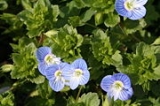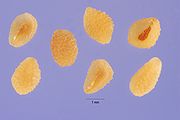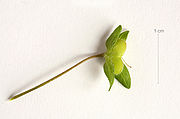
Veronica persica
Encyclopedia
Veronica persica is a flowering plant native of Eurasia
. First recorded in Britain in 1825 and now widespread in the United States
, and east Asia
(including Japan
).
s, with truncated base. The short-stalked leaves are broadly ovate (1-2 cm), having coarsely serrated margins. V. persica has weak stems that form a dense, prostrate ground cover. Tips of stems are often ascending. Leaves on the lower stems are paired, but are alternate on the upper portion of the stem. The short-petioled leaves are longer than they are broad and coarsely toothed.
The flowers (8-11 mm wide) are sky-blue with dark stripes and a white center, and they are zygomorphic (they only have one plane of symmetry, which is vertical). They are solitary on long, slender, hairy stalks in the leaf axils.
The seeds are transversely rugose, 1.2-1.8 mm, 5-10 per locule


Eurasia
Eurasia is a continent or supercontinent comprising the traditional continents of Europe and Asia ; covering about 52,990,000 km2 or about 10.6% of the Earth's surface located primarily in the eastern and northern hemispheres...
. First recorded in Britain in 1825 and now widespread in the United States
United States
The United States of America is a federal constitutional republic comprising fifty states and a federal district...
, and east Asia
Asia
Asia is the world's largest and most populous continent, located primarily in the eastern and northern hemispheres. It covers 8.7% of the Earth's total surface area and with approximately 3.879 billion people, it hosts 60% of the world's current human population...
(including Japan
Japan
Japan is an island nation in East Asia. Located in the Pacific Ocean, it lies to the east of the Sea of Japan, China, North Korea, South Korea and Russia, stretching from the Sea of Okhotsk in the north to the East China Sea and Taiwan in the south...
).
General description
The seed leaves are broadly triangular cotyledonCotyledon
A cotyledon , is a significant part of the embryo within the seed of a plant. Upon germination, the cotyledon may become the embryonic first leaves of a seedling. The number of cotyledons present is one characteristic used by botanists to classify the flowering plants...
s, with truncated base. The short-stalked leaves are broadly ovate (1-2 cm), having coarsely serrated margins. V. persica has weak stems that form a dense, prostrate ground cover. Tips of stems are often ascending. Leaves on the lower stems are paired, but are alternate on the upper portion of the stem. The short-petioled leaves are longer than they are broad and coarsely toothed.
The flowers (8-11 mm wide) are sky-blue with dark stripes and a white center, and they are zygomorphic (they only have one plane of symmetry, which is vertical). They are solitary on long, slender, hairy stalks in the leaf axils.
The seeds are transversely rugose, 1.2-1.8 mm, 5-10 per locule

Life cycle
- Annual or winter annual
- Reproduces from seed


